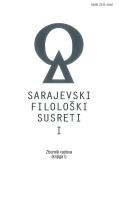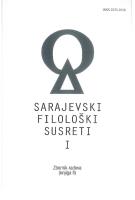Author(s): Marko Jesenšek / Language(s): Slovenian
Issue: 1/2012
The article features certain linguistic characteristics of the Slovenian translation of Meša Selimović's novel Derviš i smrt. It focuses on the translation’s language and style, the colour of the language and onomatopoeia, and certain cases where the Slovenian translator’s style flirts with linguistic solutions by e.g. Prešeren and Linhar. A huge shortcoming of Moder’s translation is sadly revealed in the Slovenisation of Turkish words and archaic expressions. Of the 255 words included in Selimović’s “Rječnik turskih i manje poznatih riječi” at the end of the novel, Janko Moder kept merely 53, and among those only 23 are from Selimović’s list (atlas, bajram, derviš, feredža, harem, hodža, hurija, jasin, jekin, kadi(ja), kujundžiluk, Latinluk, mevlevijski red, muderis, mujezin, mula, muselim, muselimat, padišah, softa, spahija, subaša, vakuf, zurna), while adding 30 new entries, which are not found in the original list. There are severe mistakes in meanings of translations of Turkish words: “derviš” is for instance translated as “menih”, “derviški red” as “meniški red”,“tekija” as “samostan”, “muselim” as “policijski predstojnik” and “muselimat” as “policijsko načelstvo”. It appears that such shifts in meaning significantly complicate genuine understanding of the Muslim world, its culture and its way of life, and lower the novel’s quality. Moder’s decision to forcefully Slovenise Turkish words was a mistake, strongly hurting the novel and spoiling Selimović’s expressive image. Moder could not fid a way to bring the Muslim terminology closer to Slovenian readers and made the wrong choice of choosing a puritan revised Slovenian terminology, which failed to replace the Turkish expressions. To a Slovenian reader, the Muslim dimension remains a mystery since he cannot experience it in its true semantic form – as if the translator had been afraid of an incursion of Turkish words into the Slovenian vocabulary.
More...


